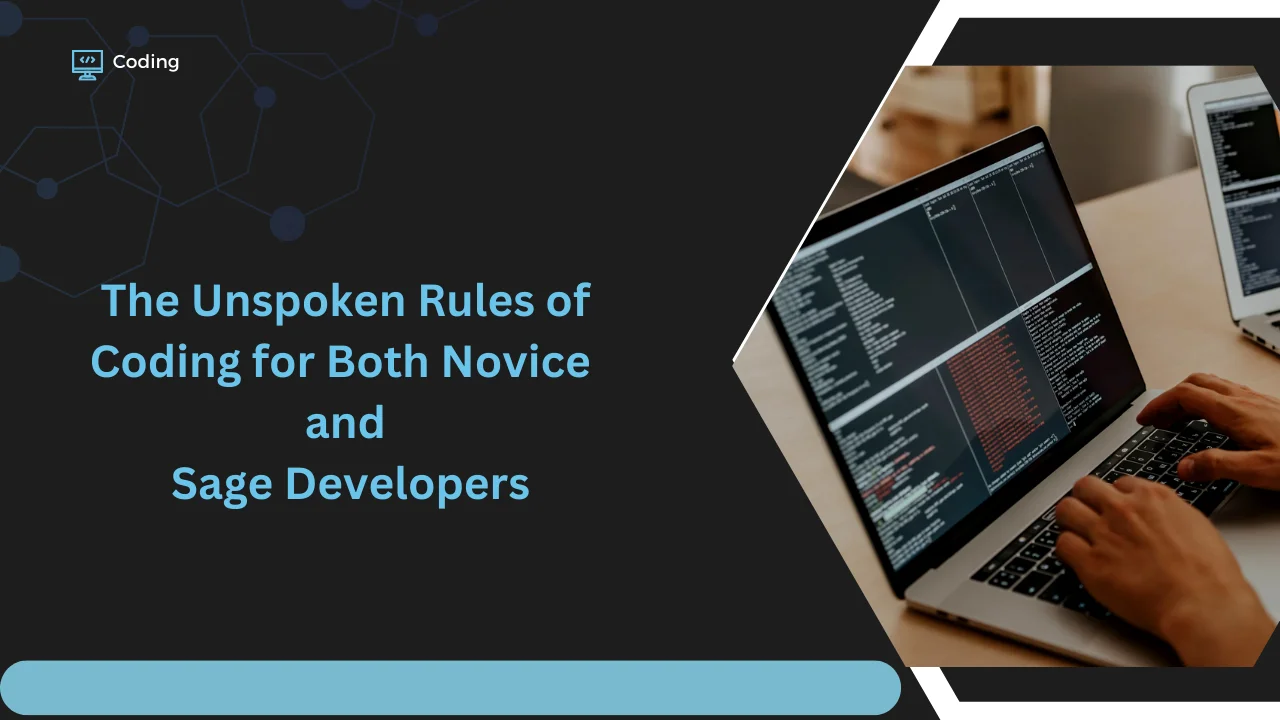The unspoken rules of coding for both novice and sage developers are a set of informal guidelines that shape how developers approach writing, maintaining, and collaborating on code. These rules are not explicitly taught but are absorbed through experience, mentorship, and practice. They aim to improve code quality, teamwork, and long-term maintainability, making them essential for both beginners and experienced professionals. This article explores these rules in-depth, focusing on how they guide novice, intermediate, and sage developers.
You May Also Like: BetterThisWorldcom
What Are the Unspoken Rules of Coding?
Coding, at its core, is about solving problems and creating solutions. However, the act of writing code involves more than technical skills. The unspoken rules emphasize clarity, collaboration, and adaptability, which are crucial for creating functional and sustainable software. These principles vary depending on a developer’s experience level. Let’s explore how these rules apply to three key stages of development: novice developers, intermediate developers, and sage developers.
Novice Developers
For novice developers, the journey begins with mastering basic programming concepts, syntax, and tools. At this stage, the unspoken rules of coding for both novice and sage developers focus on learning and forming good habits that will benefit them throughout their careers.
Clarity and Simplicity First
Novices must write code that is easy to read and understand. This means using meaningful variable and function names and avoiding overly complex logic. For example, instead of naming a variable x, it’s better to use something descriptive like totalPrice or userName. Clear code makes debugging easier and helps others understand your work.
Learn Version Control
Version control systems like Git are vital for tracking changes and collaborating with others. Novices should learn to commit code regularly, write meaningful commit messages, and use branches for experimenting. This habit not only protects their work but also prepares them for team-based development.
Ask for Help Thoughtfully
Coding is a collaborative effort, and asking for guidance is essential. However, it’s equally important to research before seeking help. Thoughtful questions demonstrate a willingness to learn and improve problem-solving skills.
Intermediate Developers
Intermediate developers, often overlooked in discussions about coding expertise, are those who have moved beyond basic programming but are still refining their skills. The unspoken rules of coding for both novice and sage developers guide intermediate developers to focus on refining efficiency, adopting advanced practices, and becoming team players.
Write Reusable and Modular Code
Intermediate developers must focus on writing reusable and modular code. This involves breaking down problems into smaller functions or classes that can be reused across the codebase. For example, instead of copying and pasting similar code, they should create a function that handles the task dynamically.
Follow Team Standards
At this stage, adhering to team coding standards is crucial. This includes following style guides, maintaining consistency in naming conventions, and respecting established processes. Teamwork becomes a significant focus for intermediate developers as they work more collaboratively.
Embrace Testing
Intermediate developers should start incorporating testing into their workflow. Writing unit tests, integration tests, and edge-case scenarios ensures their code is reliable and reduces bugs in the long run. Testing is not just an optional skill—it’s a professional responsibility.
Sage Developers
Sage developers are seasoned experts who have mastered the technical and interpersonal aspects of coding. The unspoken rules of coding for both novice and sage developers guide them to focus on leadership, maintainability, and long-term impact.
Code for the Future
Sage developers prioritize maintainability and scalability in their work. They write code that others can easily understand and extend. This involves adhering to principles like DRY (Don’t Repeat Yourself) and SOLID design patterns, which ensure code remains flexible and reusable.
Mentor and Guide
A key responsibility for sage developers is mentoring less experienced teammates. Sharing knowledge, providing constructive feedback, and fostering a collaborative environment are integral to their role. By guiding others, they help build stronger, more cohesive teams.
Refactor and Optimize
Sage developers are skilled at identifying areas for improvement within a codebase. They regularly refactor code to improve performance, readability, and efficiency. While they aim for high-quality work, they also know when “good enough” meets project requirements to avoid overengineering.
Balancing Perfection and Deadlines

Experienced developers understand the balance between perfection and practicality. They focus on delivering functional, high-quality solutions while meeting deadlines. This balance is vital for keeping projects on track without compromising critical functionality.
Common Ground for All Developers
Despite differences in experience, certain unspoken rules apply universally to novice, intermediate, and sage developers. These include:
| Aspect | Novice Developers | Intermediate Developers | Sage Developers |
|---|---|---|---|
| Code Quality | Focus on readability and simplicity | Write reusable and modular code | Prioritize maintainability and scalability |
| Collaboration | Learn to ask for help | Work within team standards | Lead and mentor |
| Testing | Learn basic debugging skills | Begin writing unit tests | Ensure comprehensive testing coverage |
| Documentation | Comment for clarity | Document code logic | Create team-oriented documentation |
Why the Unspoken Rules of Coding Are Beneficial for Developers
The unspoken rules of coding for both novice, intermediate, and sage developers are immensely beneficial because they serve as guiding principles that shape how developers grow, collaborate, and create sustainable software. These rules impact every stage of a developer’s journey, from learning basic skills to leading teams, ensuring both individual success and team efficiency. Let’s explore the detailed benefits for each level of experience.
Benefits for Novice Developers
Let’s discuss about the benefits of unspoken rules of coding for novice developers.
Learning Good Habits Early
For novice developers, following these rules helps establish good habits that prevent common pitfalls. Writing clear and readable code, for instance, ensures they avoid the complexities of “spaghetti code,” where functionality becomes difficult to understand or maintain.
Building Confidence in Skills
The rules provide a structured approach to learning, helping novices grow confidence as they write functional and effective code. Understanding tools like version control or debugging makes them feel more capable of contributing to projects.
Effective Collaboration with Teams
By learning to ask questions thoughtfully and respect team coding standards, novices become better collaborators. This creates opportunities to gain valuable feedback and learn from more experienced peers, accelerating their learning curve.
Benefits for Intermediate Developers
Let’s discuss about the benefits of unspoken rules of coding for intermediate developers.
Refining Technical Expertise
Intermediate developers benefit from these rules by improving their problem-solving skills and learning to write modular and reusable code. This not only enhances their efficiency but also ensures the codebase remains clean and maintainable for the long term.
Developing Professional Testing Skills
Incorporating testing as a core part of their workflow prepares intermediate developers for larger responsibilities. Testing ensures their work is reliable, reduces bugs, and saves time in debugging later stages of development.
Becoming Effective Team Players
By following team standards, contributing to discussions, and documenting their code effectively, intermediate developers bridge the gap between individual coding and collaborative development. They become integral to the team’s success.
Benefits for Sage Developers
Let’s discuss about the benefits of unspoken rules of coding for Sage developers.
Ensuring Long-Term Project Success
Sage developers focus on writing scalable and maintainable code. These unspoken rules help them create solutions that stand the test of time, reducing the risk of technical debt that can plague future iterations of a project.
Strengthening Leadership Skills
Mentoring junior and intermediate developers is a key role for sage developers. These rules provide a framework for teaching best practices and guiding less experienced teammates, building stronger and more cohesive teams.
Balancing Innovation with Practicality
Experienced developers understand the importance of balancing perfection with deliverables. These rules help them prioritize what’s most important while ensuring the project meets deadlines without sacrificing quality.
Shared Benefits Across All Experience Levels
Let’s discuss about the benefits of unspoken rules of coding for all developers.
Improving Collaboration and Workflow
The unspoken rules create a universal language that bridges the gap between novices, intermediates, and sages. Everyone works under a common set of principles, ensuring smoother communication and collaboration.
Enhancing Code Quality
Adherence to rules like clarity, testing, and modularity improves the overall quality of the codebase. High-quality code means fewer bugs, better performance, and easier maintainability.
Preparing for Future Challenges
By following these principles, developers are better equipped to handle more complex challenges as they grow. Novices become intermediates, intermediates become sages, and sages refine their leadership and innovation skills.
Creating Future-Proof Software
These rules ensure that the codebase is adaptable, scalable, and easy to extend. This is particularly important for projects that will evolve over time or involve large teams.
Why These Rules Matter
The unspoken rules of coding for both novice, intermediate, and sage developers are not just about writing good code—they are about fostering growth, collaboration, and sustainable development. For novices, these rules provide structure and direction. For intermediates, they refine skills and enhance teamwork. Finally, for sages, they guide leadership and ensure long-term success.
By following these rules, developers of all levels contribute to creating high-quality software, working effectively in teams, and continuously growing in their careers. These benefits ensure that both individuals and organizations thrive in an ever-evolving tech landscape.
You can also read MangoAI. com
Conclusion
The unspoken rules of coding for both novice and sage developers provide a roadmap for growth and success at every stage of a developer’s journey. Novice developers should focus on building strong foundations, learning tools like version control, and writing clear code. Intermediate developers must refine their skills, embrace teamwork, and begin adopting advanced practices like testing and modular design. Sage developers, as leaders, prioritize maintainability, guide others, and ensure the long-term success of their projects.
By adhering to these unspoken rules, developers create a collaborative and efficient coding culture that drives innovation and ensures success for teams and individuals alike.



